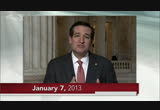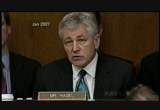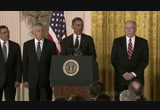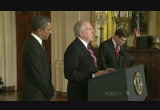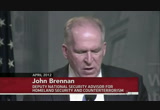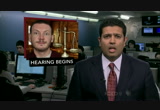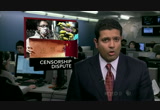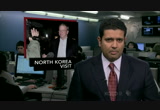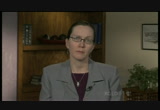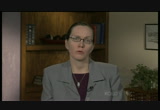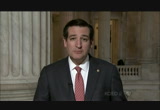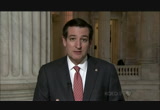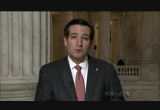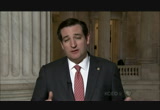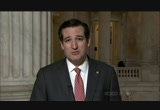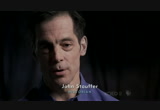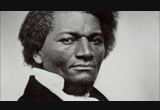tv PBS News Hour PBS January 7, 2013 3:00pm-4:00pm PST
3:00 pm
>> i would have voted against it because i think it was a lousy deal. it wasn't a serious response to the grave fiscal and economic problems facing this country. >> major funding for the pbs newshour has been provided by: moving our economy for 160 years. bnsf, the engine that connects us. >> and by the alfred p. sloan foundation. supporting science, technology, and improved economic performance and financial literacy in the 21st century.
3:01 pm
>> and with the ongoing support of these institutions and foundations. and... >> this program was made possible by the corporation for public broadcasting. and by contributions to your pbs station from viewers like you. thank you. >> woodruff: today's announcement at the white house sets up a pair of potential confirmation fights. president obama's choices to oversee the pentagon and the c.i.a. will now be called to answer questions about everything from israel to iran to interrogations. there has been much speculation about both nominations, but the president made them official this afternoon in the east room of the white house. >> my choice for two key members of my national security team. chuck hagel, former secretary of defense and john brennan for
3:02 pm
director of the central intelligence agency. >> woodruff: hagel is a vietnam veteran who would replace the retiring leon panetta. he would be the first defense secretary who saw combat as an enlisted soldier. >> in chuck hagel our troops see a decorated combat veteran of character and strength. they see one of their own. chuck is the champion of our troops and our veterans and our military families. as the leader of the v.a., he fought to give our veterans the benefits they deserve. as head of the u.s.o., he devoted himself to caring for our troops. >> woodruff: the former senator from nebraska who left office in 2009 said he especially wants to serve those in uniform. >> these are people who give so much to this nation every day. with such dignity and selflessness. this is particularly important at a time as we complete our mission in afghanistan and
3:03 pm
support the troops and military families who have sacrificed so much over more than a decade of war. >> woodruff: but on sunday senate minority leader mitch mcconnell made clear his fellow republican will face close scrutiny when the confirmation process begins. >> i think it would be a lot of tough questions of senator hagel, but he'll be treated fairly by republicans in the senate. >> woodruff: even independent and us king of maine suggested it may be a rough ride. >> i'm going to want to ask some serious questions and hear from senator hagel about the issues. >> woodruff: for republicans the reservations can be traced to hagel's vocal opposition to the iran war after he initially voted for it and to the 2007 troop surge that he called... >> the most dangerous foreign policy blunder in this country since vietnam. >> woodruff: hagel's views on israel could pose greater problems. in 2008 he referred to israel's
3:04 pm
u.s. supporters as the jewish lobby, drawing concern from senators in both parties. iran is still another flash point. as a senator, hagel voted against trade sanctions and more recently has criticized talk of a military strike on iran's nuclear site. the president today defended hagel's maverick refutation going back to when they served together in the senate. >> i came to admire his courage and his judgment, his willingness to speak his mind even if it wasn't popular. even if it defied the conventional wisdom. that's exactly the spirit i want on my national security team. the recognition that when it comes to the defense of our country we are not democrats or republicans, we are americans. >> woodruff: the president is also close to john brennan who has been counterterror advisor since 2009 and was instrumental in planning the operation to capture osama bin laden. >> a 25-year veteran of the
3:05 pm
c.i.a., john knows what our national security demands. intelligence that provides policy makers with the facts, strong analytic insights and a keen understanding. >> woodruff: at the c.i.a. brennan would succeed retired general david petraeus who resigned last year after admitting to an extra marital affair with his biographer paula broadwell. brennan said today that the c.i.a. needs the support of the country as it faces growing challenges. >> if confirmed as director i will make it my mission to ensure that the c.i.a. has the tools it needs to keep our nation safe and that its work always reflects the liberties, the freedoms and the values that we hold so dear. >> woodruff: but brennan too may face tough questions. he took himself out of the running for the c.i.a. job four years ago amid criticism for supporting so-called enhanced
3:06 pm
interrogations. when he ran the national counterterrorism center under president bush. brennan hassles defended rendition, the practice of sending terror suspects to other countries where they might be subject to torture. he said on the newshour in 2005. >> i think it's an absolutely vital tool. i have been intimately familiar with the cases of rendition that the u.s. government has been involved in. i can say without a doubt that it has been very successful as far as producing intelligence that has saved lives. >> woodruff: last year brennan spoke at length about another much-debated tool in the u.s. war on terror. using unmanned drones to kilterror suspects. >> there is nothing in international law that bans the use of remotely piloted aircraft for this purpose or that prohibits us from using lethal force against our enemies outside of an active battlefield. al qaeda has been left with just a handful of capable leaders and operatives. with continued pressure is on
3:07 pm
the path to its destruction. >> woodruff: both brennan and hagel will now prepare for their confirmation hearing likely to be scheduled later this winter. so wha so what do the president's choices tell us about his second term national security priorities? for that, we turn to jessica tuchman mathews, president of the carnegie endowment for international peace. she's held posts at the state department and on the national security council staff. and reuel gerecht, a former case officer at the c.i.a. he's now a senior fellow with the foundation for the defense of democracies. let's step back from the two individuals we just saw judy talked about there. tell us what these selections tell us about this administration's foreign policy, national security priorities. >> i think you heard the president say it. he wants people with personal weight, with experience, and who are non-ideologues. who are open to hearing facts as they come. you know, there is a kind of
3:08 pm
personal gravitas that comes with decades of experience that you can't substitute with briefings or anything else. it's there or not. both these gentlemen have it. >> ifill: reuel gerecht. suspect the president has revealed his strategic vision particularly with the choice of senator hagel on defense. i think the two men share the view
3:09 pm
in this case i think the answer is an unequivocal yes. >> ifill: your response to that? well, i would say that, one, there's not hundreds of billions of dollars that you can cut from the defense department. i would say iraq and the afghan wars reveal that actually we need to increase defense spending. in particular, i think the navy and the army are in serious need of repair. and the notion that you can
3:10 pm
continue to slice away at the defense budget as a means of showing some type of restraint with the budget i think is a terrible, terrible mistake. >> ifill: does the president's selection of senator hagel in particular but also mr. brennan speak at all to his plos fee of intervention around the world? for instance, there is some discussion about what senator hagel's views are about what whether and how we should step into our deter iran. >> he has expressed reservations about going to war and about the use of military force as a way to solve problems. i think that's a credential that the u.s. would want in every secretary of defense. he's seen the face of war. personally. so he knows what its pluses and minuses. but in terms of whether he's a believer in american hegemony or not, this is a guy, as i said before, who is not an ideologue. he doesn't come in with a neo imperialist, neo con view.
3:11 pm
he comes in... he's a pragmatist. he's very like the president, i think, in that respect. he's a listener. he doesn't... and he's open enough to hear what's being said to him. i think it would be very difficult to read into his appointment any particular policy on any particular question. >> i disagree with that. i think senator hagel actually is fairly ideological in the sense that he is consistently opposed to american spehr convenience abroad. he's i think very skeptical that the united states, when it exercises its force abroad, is doing the right thing, is helping the good. >> you can say that about a man who volunteered to go to vietnam? >> i don't think that's a relevant issue. i think it's quite noble and honorable that he did so. i think if you asked his friend, say, senator mccain, who also went to vietnam and suffered
3:12 pm
quite horribly, they have a different view about the exercise. >> fair enough. about american power. ifill: do you think that that vietnam experience and how it has influenced whatever his thinking is today is a good thing or a bad thing? >> i would say in senator hagel's case it has been a profound... it has had a profound impact on him. he's the first generation of what you might call the vietnam syndrome. he's scared of the use of force abroad. i would just suggest that since world war ii i think the order that we have known, the prosperous more or less peaceful order that we have known as been because of the exercise of american power abroad. i think senator hagel was wrong on iraq. he's wrong on afghanistan. and i think these are very dangerous times. he's in fact in serious disagreement with the president. the president made it very clear that if iran does not stop its nuclear program that he will take the united states to war to stop it. >> obviously the president is satisfied that he's appointing
3:13 pm
somebody who sees eye to eye on this critical issue. >> ifill: john brennan, someone that the president is also very close to, who has been basically in his ear at the white house for some time now. and is most... he's identified in the public eye at all, it is his connection to the oversight of the drones, the targeted killing from the drones. is that something which he's going to get serious questioning on capitol hill? >> i think there are more serious substantive questions that are open with respect to john brennan although there are also the same set of... this is... the c.i.a., of all government agencies, has its own culture. you need to leadity fek tively you need to be part of that culture and affected by the people inside. he is. he has 25 years there, but he also is associated with a set of still very open policy questions. >> ifill: including enhanced
3:14 pm
interrogation. >> water boarding, enhanced interrogation, rendition and the use of drones and the question about what precedents we are setting up with this very vigorous use of drones that we may not wish to live with. to be honest, i think that the characterization of senator hagel is a caricature. i don't see anything in his long decades of service that qualifies for what you've just... >> ifill: but... think there are real issues... >> ifill: about brennan? that are still somewhat open. i take the opposite view. i think mr. brennan is probably going to have a fairly easy confirmation. i think the left and some on the right but mostly on the left are a bit upset with his past, with rendition. certainly people inside of the agency, i think, in the clandestine service are a bit upset with the way mr. brennan
3:15 pm
flipped on the issue of aggressive interrogation where he was once a fairly enthusiastic backer of it. and then, as they would say, changed his tune on that when he joind up with now president obama. >> ifill: here's one of the interesting things he was quoted as saying after the the killing of osama bin laden that they had decapitated the head of the al qaeda snake. we now know al qaeda is still alive and well in different areas of the world. is he right about that? >> i think it was an overstatement. >> i agree. i think that was a little bit... snep but not a disqualifying one? >> no. , i wouldn't disqualify him for that at all. again, i think mr. brennan isn't probably... if he can get over the hurdles of the way he's conducted the drone campaign -- and i don't think there are going to be that many queries about that. i think on the the republican side, there will be more or less agreement on that. even on the democratic side. i don't think they're going to
3:16 pm
go against the president on this issue. >> ifill: you're not crazy about either of these two nominations. you support them both. how much latitude do you think the president should have in the end on these kinds of cabinet nominations? >> well, you're asking what is the role of advice and consent for the senate? to my mind it is largely a question of qualification. i think both these two nominees passed that bar by a long shot. >> i think it's a fairly elastic issue. the senate obviously can be fairly aggressive. it doesn't have to be. i think certainly way should be given to the president. but i think there should be substantial debate. i don't think there's anything wrong with the nominees going before the senate. they have to answer very vigorous questions. i think that's healthy for everybody concernedded. >> ifill: reuel gerecht, jessica tuchman mathews, thank you both
3:17 pm
very much. >> woodruff: still to come on the newshour, the multibillion- dollar foreclosure settlement; holding the line on health care spending; and the new texas senator, republican ted cruz. but first, the other news of the day. here's hari sreenivasan. >> sreenivasan: secretary of state hillary clinton returned to work today after a month-long health scare. she came down with a stomach virus last month that left her severely dehydrated. then, she fainted, struck her head and suffered a concussion, and days later, doctors discovered a blood clot in her head. on her return today, staffers presented her with a gag gift: a football helmet bearing the state department seal. the fighting in syria raged throughout the day, just hours after president bashar al-assad proposed an end to the conflict on sunday. in his first public speech in months, assad offered a national reconciliation conference. but at the same time, he branded the rebels "murderous criminals" that the west should not support. in washington, state department spokesperson victoria nuland dismissed the speech. >> i don't think there's anything about the speech that
3:18 pm
changes the progression of work that we're doing with the opposition. i think we have to continue to see how things develop on the ground. we have to continue to see how they develop as a force, but, as we have said, we do consider them the legitimate representatives now of the syrian people. >> sreenivasan: last week, the u.n. estimated that nearly 60,000 people have died in the syrian civil war. prosecutors in india moved forward today in the case of five men accused in the gang rape and murder of a young woman in new delhi. the suspects heard the charges against them in a preliminary hearing. then they left court with their heads covered, to be escorted back to jail. meanwhile, protesters gathered outside the courtroom, insisting that lawyers refuse to represent the suspects. despite the demands, two attorneys did come forward, offering to serve as defense counsel. the man accused of carrying out a mass shooting at a colorado movie theater also appeared in court. james holmes allegedly killed 12 people and wounded dozens more last july. outside the courtroom this morning, survivors and families
3:19 pm
of the dead lined up for a seat at the hearing. it's expected to last all week, as the prosecution outlines its case. inside, the 25-year-old holmes showed no emotion as police testified about arresting him shortly after the attack. cancer deaths continued to decline between 2000 and 2009. men were 1.8% less likely to die in ten of 17 common types of cancers. death rates for women fell 1.4% in 15 of 18 leading forms of the disease. researchers do warn, however, that cancers associated with obesity are on the rise. the findings are from an annual report by government researchers and the american cancer society. crews in australia searched for the missing today after wildfires ravaged the island state of tasmania. tinder-dry conditions fueled the fires that broke out friday. though there were no reports of deaths, some 100 people were unaccounted for. we have a report narrated by sejal karia of independent television news. >> reporter: in the small town,
3:20 pm
firefighter alan miller captures the terrifying moments when the wild fires engulfed his home. >> just completely burned to the ground. >> reporter: exhausted from battling the flames for two days, all he could do was watch. but it was when his brother luke's house caught fire, a home he helped build, that he was overcome with emotion. >> i'm really sorry, luke. i couldn't get there. it's everywhere. i just couldn't get down the road. >> reporter: help did eventually arrive but too late. theirs is just one place of devastation on an island where hundreds have lost their homes and parts of their town. the australian prime minister julia gill ard visited one of the worst affected places, where the fires destroyed 65 buildings including the local primary school. >> the very fact i'm here shows
3:21 pm
that the rest of the nation has got its eyes on tass mania and the rest of the nation needs thinking about the losses here and will be supporting tass mainians. >> reporter: there are fears for 100 people still missing though no reports of deaths so far. and the wild fires still rage while another week of intense heat looms. >> sreenivasan: police have charged a 31-year-old man with starting one of the fires by leaving his campfire unattended. in china, rare protests erupted against official censorship of one of the country's most liberal newspapers. hundreds of people gathered in guangzhou, outside the headquarters of "southern weekly." they held hand-written signs and chrysanthemums as a sign of symbolic mourning for the death of press freedom. last week, the newspaper tried to print a new year's letter calling for political reforms. censors replaced it with a story lauding the ruling communist party. google's chairman, eric schmidt, began a private visit to north
3:22 pm
korea today. he arrived with a delegation being led by former new mexico governor bill richardson, who's been to north korea numerous times in the last 20 years. schmidt hopes to get a firsthand look at north korea's social media, and richardson said they'll also ask about a south- korean-born american citizen arrested in the north last november. >> we're here as individual american citizens to look at the humanitarian situation. we're going to ask about the american detainee who is here. we're interested in the economic and political situation. we are concerned about the missile launches and we're concerned about the importance of dialogue. >> sreenivasan: north korea's most recent launch came less than a month ago. because of that the u.s. state department urged the men to cancel their trip. wall street started the week by giving some ground. the dow jones industrial average lost nearly 51 points to close
3:23 pm
at 13,384. the nasdaq almost three points to close under 3099. those are some of the day's major stories. now, back to gwen. >> ifill: and we turn to the settlement reached today between the government and several of the nation's largest banks over their foreclosure practices. margaret warner has the story. >> warner: ten of the country's major banks have agreed to pay $8.5 billion to settle claims that they wrongfully foreclosed on homeowners during the height of the housing crisis. the companies include giants jp morgan, bank of america, and wells fargo. it stems from the way they handled some millions of foreclosures during 2009 and 2010. more than $3 billion of the settlement will go in direct payments to borrowers foreclosed on during those years. another five billion is earmarked for other assistance to homeowners who are struggling now. in another settlement stemming from the housing crisis, bank of america today agreed to pay fannie mae $11 billion.
3:24 pm
for more, i am joined by two people who track the housing industry closely from different lenses. guy cecala is publisher of "inside mortgage finance," a housing industry research publication. and diane thompson of the national consumer law center. welcome to you both. diane thompson, beginning with you, remind us first of the sorts of abuses that gave rise to this settlement. >> fundamentally what we're talking about are wrongful foreclosures, foreclosures of homes that should never have been foreclosed on. people lost their homes because of the banks' misdeeds, because the banks of violating the law. the banking agencies found that there were repeated and pervasive violations of the law. everything from putting people into default who had not been to wrongfully foreclosing upon people in the military to failing to process people for loan modification correctly and in time. the result was that homeowners were out on the street.
3:25 pm
>> warner: guy cecala, when this settlement process began back in 2011 even the banks admitted. >> definitely. there were 14 banks originally part of the banking regulator settlement. all of them basically admitted that they did things like robo-signing and other abuses of the foreclosure process. >> warner: robo-signing that not people but machines signed these papers saying they had actually reviewed the mortgage. >> exactly. signing off on mortgage documents that they hadn't specifically reviewed. >> warner: back to you diane thompson. there's $8.5 billion in this settlement. how does that stack up against the total losses or damage that at least homeowners assert that they lost? in these practices? >> i think we'll never know exactly how it stacks up against the total damages. the one big hope for this review
3:26 pm
process had been that we would finally get a complete accounting of the failures of the large banks, and there were lots of problems with that review process. i think the agencies have correctly decided to abandon it. but what that means is ha we now will never know the extent of the wrongdoing and what the actual harm was. but i think reasonable estimates of the harm done put the total harm in the... to homeowners covered by the settlement in the tens of billions of dollars. significantly more than will be paid. >> warner: when ms. thompson talks about the original review process, this was something when it started in 2011 they were going to look at every loan individually. is that right? >> yes, specific banks were charged with going through their foreclosure files and looking at each case and finding out what the misdeed may have been, how the borrower was hurt and coming up with even a monetary value of what they would do. >> warner: what was the problem with that?
3:27 pm
why does ms. thompson say it didn't really work? >> the review process became drawn out. the bank hired third-party consultant firms to do it. i don't think they're half finished with the number of loans they've gone through and we're at the end of 2012 so it's been going on for a year-and-a-half. >> warner: ms. thompson, thomas curry, the comptroller o curreny said said that this will get more money to more people more quickly than if original enforcement action and the process that it had kicked off back in 2011. do you agree with that? >> i hope that's the case. i think we don't know whether or not that will be the case. whether or not that's the case will really depend upon the enforcement and oversight mechanisms that we put in place. >> warner: how will they decide who gets at least the amount that's going to the wrong homeowners, the 3.... over three
3:28 pm
billion? who will get it? >> i think that's a very good question. you know, if you do the numbers, it's clear that on average people are not going to get anything like what most of us would think would be reasonable compensation for losing your home. without the individual file review that's not clear how they will determine who gets how much money. i do anything that speeds up the process and provides a fairer result than we were getting with the reviews is a good thing. but we're going to need a lot of oversight and a lot of transparency if we're going to have any public confidence in the results of this process. >> it appears that the government is giving up on finding out who is actually harmed due to any of these foreclosure abuses, and just focusing on borrowers who went through the foreclosure process. >> warner: you mean anybody... there were what? 3.8 million, nearly four million homeowners. they're all eligible for a piece of this potentially? >> i believe some small piece
3:29 pm
perhaps. >> my understanding is that the numbers are going to vary dramatically. they've talked about payments in the hundreds of dollars ranging to $125,000. how they're going to decide who gets what is not clear. some of these homeowners have submitted complaints for review. some of them have not. how you equalize all of that and make sure the distribution is going to all demographic groups evenly and fairly is going to be a very difficult problem. >> warner: so meanwhile, of course, foreclosures continue, mr. cecala. has the bank changed the way they handle foreclosures as a result of this? >> theoretically back in 2011, once the federal bank regulators came out with this original agreement, 14 of the largest bank services did agree immediately to change their foreclosure practices to avoid the type of abuses that we saw in the past. they also agreed to do things like not do duel tracking of a
3:30 pm
loan modification and foreclosure at the same time. in theory those practices went in effect in 2011 and are in effect now. there have been different reports on whether that compliance has been full but technically that's the law of the land right now. >> warner: ms. thompson, you represent quite a few people in this situation. what's your view of whether if banks have changed their practices and are more transparent and do it properly? >> it's true what mr. cecala says that this has been the law of the land since 2011. it was the law of the land long before 2011. none of the practices at the banks got their hands slapped for were ever legal. they were always illegal. the practices that they engaged in were always impermissible. they've continued to engage in them since. the previous foreclosure review process was not effective in
3:31 pm
stopping those practices. we hope very much that with this process now underway that there will be effective enforcement of these standards so that homeowners who are entitled to loan modifications where the loan modifications would benefit both investors and homeowners would get the loan modifications in a timely way. >> warner: briefly, mr. cecala, has regulatory oversight been toughened up since those days? >> a basic problem is most of the banking regulators, certainly the ones involved in the office of the comptroller of the currency and the federal reserve, are primarily safety and soundness regulators. their primary goal in life is to make sure that the banks don't go under and to cause losses to the tax payers. they haven't ever been very strong on the consumer front. to some extent that's why congress in the dodd frank legislation several years ago created the consumer financial protection bureau which is about to finalize new servicing
3:32 pm
regulations with the hope that a new agency charged with protecting consumer rights particularly in the mortgage process will do a better job of what banking regulators. >> warner: looks like this is certainly not behind us yet. guy cecala and diane thompson, thank you both. >> woodruff: now, what's behind the continuing rise in health care spending, and why the rate of growth has slowed. ray suarez has the story. >> suarez: for the third consecutive year, health care spending in the u.s. grew by just under 4%. government data released today show that roughly 2.7 trillion dollars was spent in total in 2011 or just under $8700 a person. that 4% increase is above the rate of inflation but it's well below the recent historical trend. the information was published today in the journal health affairs, and to help us break it
3:33 pm
down i'm joined again by susan dentzer, the editor of the journal and an analyst for the newshour. susan, has this ever happened before? have we ever had a three-year run of such modest price increases? >> not in the 52 years in which these national health expenditure data have been collected. it really is unprecedented. and clearly it's very much linked to the very dramatic recession we had and the slow growth period that has followed it. we never have seen though, even though it is the case that recessions always produce a slowdown in health care spending growth, we've never seen one quite of this magnitude. it never has kicked in quite as early as this one did. it's almost as if as soon as the recession set in, health spending growth really plummeted and we continue to see the effects to this day. >> suarez: so if the recession is a part of it, do we know whether it was from people trying to spend less on health care, whether this was consumer driven, or on the provision side
3:34 pm
where the price increases is just not there because the providers didn't think they can get those prices? >> clearly more of it was happening on the so-called demand side. we had about seven million people lose health insurance and health care coverage on net. of course, the numbers of people that actually qualified for medicaid and got coverage but the net effect was seven million people between 2007 and 2010 without additional people without health insurance. also we had a lot of people now we do have a lot of people who are in so-called consumer-directed health plans, high deductible health plans. they're responsible for a good share of their health care spending typically. those people are probably the kinds of people who put health care spending, if it was discretionary, on hold over the course of the recession. they were obviously worried about their jobs and their income. so we saw just across the board people not getting health care, people not having insurance coverage and not getting health care. that was probably the biggest
3:35 pm
driver of this effect. >> suarez: even with the large number of americans unemployed, the large number uninsured, most americans still are covered by employer-health care plans. was there anything different about the way money was being spent there? >> well, again to the degree those people, some of them are in high deductible health plans, yes, they seem to be spending less. sometimes even on things that they're actually covered for. we have seen health spending increases in the employer covered population also moderate. overall health insurance premiums for the whole population, private health insurance premiums are also rising or at least as of 2011 were still rising at about 4% across the board. and for employer groups typically large employer groups it's also been in that range 3-4%. most recently we are seeing some pick-up in people who are not in
3:36 pm
large employer groups. those are people who are either in individual health insurance or small business health insurance. those historically have been the areas of health insurance coverage that have been the most volatile and most subject to price increases and price swings so we still are seeing that. but again the bigger picture at least through 2011 was the rate of growth that is much closer to the overall rate of growth of the general economy. >> suarez: is this a pretty uniform phenomenon or are there regional variations? are there places in america where it's a relative bargain to get health care some. >> there are some regional variations. it's important to note there are program-by-program differences. medicaid spending on a per-person basis actually looks like spell in 2011 according to these data whereas medicaid spending was up. also within the medicare
3:37 pm
program, if you were in the medicare advantage program, which is the h.m.o.s and p.p.o.s, that side of medicare as opposed to the free-for-service programs, there were different rates of growth in the programs. so it's a big story, a $2.7 trillion health care system is a big story. we do see this patchwork quilt of ircht different things going on depending on which piece of the quilt you're looking at. >> suarez: today the secretary of h.h.s. noted it's roughly the name amount of g.d.p. year on year on year over these three years. it hasn't been growing as a share of the economy. but also a report over the weekend came out that showed that some people who are in those small groups buying their own insurance have been faced by tremendous increases: 15, 17, 20% in the cost of their insurance policy. >> yes. we can imagine -- we don't know this for a fact because we don't have access to all of the underlying data here -- but what it looks like certainly happened and in fact the chief actuary of
3:38 pm
the centers for medicare and medicaid service made the point in a news conference we had today, to think about people who were in small employment groups or individual insurance particularly over the course of the recession. a lot of people lost that coverage. a lot of small businesses dropped coverage. a lot of people who had individual insurance couldn't afford it anymore. people who stayed ensured were most likely people who needed coverage. they were likely to be people who had a multiple chronic disease. probably what happened is those people were very high utilizers of their health coverage. what is possibly going on now is insurers are saying, well, we spent a lot of money on this population. we have to reprice that going forward. it's true that the new health care reform law gives states and the federal government tools to push back on health insurance premium increases that are not warranted. clearly some of them are. and a lot of it is this increase in utilization that we see from a high use population of
3:39 pm
chronically ill people. >> suarez: susan dentzer, as always, thanks for joining us. >> great to be with you, ray. >> woodruff: and to another in our conversations with newly elected members of the u.s. senate. texas republican ted cruz previously served as the state's solicitor general, and also worked in the george w. bush administration. the 42-year-old cruz defeated his democratic challenger by a wide margin in the november election, with strong support from the tea party. he took the seat of republican kay bailey hutchison, who retired. over the weekend, cruz said he would find it "very difficult" to support chuck hagel for defense secretary. cruz charged the former nebraska senator had "advocated weakness" in his foreign policy views. i spoke with him last friday from capitol hill. welcome, senator ted cruz. congratulations.
3:40 pm
let's start out talking about washington. most americans seem to think this city is dysfunctional. they have a very low opinion of the congress. what do you think the problem is is? what would you do about it? >> well, i think right now we've got a major problem that we're just going broke. we have spending money we don't have. there is a real lack of common sense in the capital. you have had career politicians from both parties who have been in power a long time. they continue to spend and spend and spend money we don't have. >> woodruff: you have said that you would have voted against a fiscal cliff bill that came through the senate is few days ago. but the republican leader in the senate, mitch mcconnell was in favor of it. he helped put it together. most republicans in the senate including your fellow texan john cornyn voted for it. >> i would have voted against it because i think it was a lousy deal. it had two parts.
3:41 pm
number one it raised taxes by $620 billion. that's going to kill jobs. it's going to hurt small businesses. he's going to hurt every american. but number two, it combined those tax increases not with spending cuts, which is what president obama campaigned on every day, but instead with spending increases. $330 billion in additional new spending. that just made the problem worse. it wasn't a serious response to the grave fiscal and economic problems facing this country. >> woodruff: i remember reading your father said that you weren't coming to washington to compromise. are you saying compromise is a bad thing in our system of government? >> well, no, not at all. in fact my view on compromise is exactly ronald reagan's view. president reagan said what do you do if they offer you half a loaf? answer, you take it. then you come back for more. i am very, very happy to compromise, to work with anybody, democrat, independent, libertarians. i've joked i'll work with
3:42 pm
martians, if they're willing to cut spending, to tackle the debt, to have fundamental tax reform, to have regulatory reform and pro growth policies. we've got to fix these problems. i think most americans are not interested in the political battles that happen here in the capital. sthair interested in common sense solutions that pull us back from this crushing debt and that get our economy growing and jobs thriving again. >> woodruff: you've also said, senator cruz, that you are prepared to use the debt ceiling vote as a bargaining tool. but some look at that and they say, you could be risking the downgrading of u.s. government debt, u.s. government bonds again. >> you fast forward to the debt ceiling. i think that's the mirror image of the fiscal cliff. because the default, if nothing happens, is that the debt ceiling is not raised. what that means it doesn't mean, as some who would demagogue this issue suggest, i doesn't mean a default on our debt.
3:43 pm
whatnot raising the debt ceiling would mean is a partial government shutdown. roughly 40 cents of every dollar the federal government spends is borrowed. if you don't raise the debt ceiling, that 40 cents is temporarily stopped. now we did that in 1995. we didn't default on our debt. >> woodruff: right. the result was balanced budgets and some of the greatest fiscal responsibility was seen we've seen in modern times from congress because fiscal conservatives stood together and said we need to be responsible. >> woodruff: let me ask you about a couple of other issues. that is guns. you're a long-time proponent of gun rights. you're the father of two young girls ages 4 and 2. after those terrible shootings at that h elementary school in connecticut, have you changed your views at all on how available guns should be especially the high-capacity rifles? >> i think every parent was horrified at what happened in newtown connecticut. to see 20 young children and six
3:44 pm
adults senselessly murder in an elementary school, it's just shocking beyond words but i think it was also sad that within almost minutes of that tragedy politicians began exploiting that horrible crime to push their gun-control agenda. i do not support that agenda. in fact, i intend to help lead the fight to stop senator dianne feinstein's bill to pass aggressive gun control and in particular to pass a national firearms registry. i don't think the federal government has any business keeping a list of law-abiding americans who exercise their constitutional right to coop and bear arms. >> woodruff: you think assault weapons, high capacity guns should continue to be easily available? >> what i think is two things. number one, that restricting the right to keep and bear arms is unconstitutional. the second amendment is an integral part of the bill of
3:45 pm
rights. what it means is politicians cannot strip the guns from law-abiding americans. number two it's misguided policy. if you look at the jurisdictions with the strictest gun control laws almost without exception, they have the highest crime rates and the highest murder rates. if you look at the jurisdictions that most vigorous protect our rights to keep and bear arms almost without exception they have the lowest crime rates and the lowest murder rates. gun control policies don't work. and they're contrary to the constitution. >> woodruff: senator, finally, a question about immigration. you're the son of a cuban immigrant. you've also said that you do not believe that there should be a path to citizenship for people who are now in the united states illegally. what do you think should be done with those individuals? >> well, i think immigration unfortunately is an issue both parties are demagoging on right now. neither is serious about solving it. i think there's widespread agreement among americans that,
3:46 pm
number one, we've got on to get serious about securing the border and about stopping illegal immigration. number two, we need to remain a nation that doesn't just welcoml but celebrates legal immigrants coming here seeking a better life, seeking the american dream. judy, when i was sworn in, when i put my hand on the bible and on the senate floor, i couldn't help but think back to 1957 when my father came as an immigrant from cuba. 18. couldn't speak english. washed dishes make 50 cents an hour. if someone had come to that teenage immigrant and told him 55 years hence his son would be sworn in as a united states senator to represent the great state of texas, that would have been unimaginable. yet on thursday my father sat in the gallery and looked down as i took the oath to be a u.s. senator. >> woodruff: for those who are here illegally now? >> my view is that wesh enforce the laws with respect to those
3:47 pm
who are here illegally now. if we secure the border and if we improve legal immigration, if we improve legal immigration, if we speed it up, if we make it more efficient, if we stop the interminable delays, that would solve much of the problem by providing an open, legal avenue for people to come in without violating the law. >> woodruff: senator ted cruz newly elected from the state of texas, thank you very much. >> thank you, judy, for having me. >> woodruff: in recent weeks we've also talked with republican je >> woodruff: in recent weeks we have also talked with republicans jeff flake of arizona and deb fischer of nebraska, democrats heidi heitkamp of north dakota and tim kaine of virginia, as well as independent angus king of maine. you can find those interviews on our web site. >> ifill: finally tonight, this year marks the 150th anniversary of the emancipation proclamation. a three-part series on pbs's "american experience" profiles
3:48 pm
the passionate anti-slavery activists who convinced president abraham lincoln to take action. "the abolitionists" tells the stories of five major figures: frederick douglass, william lloyd garrison, angelina grim- keéy, harriet beecher stowe, and john brown. this excerpt is about douglass, the african-american writer and movement leader. arizona. >> by the winter of 1845, frederick douglass had been touring the anti-slavery circuit for for four years. as he contemplated his future he couldn't imagine himself traveling forever in the shadow of his white mentors repeating his story to small gatherings of the curious and the converted. >> tell your story, frederick. but whisper my friend william lloyd garrison as we stepped upon the platform. i cannot always obey for it did not satisfy me to simply they're
3:49 pm
rate wrongs. i felt like denouncing them. besides, i was growing. and i needed room. >> that winter douglass decided to reach out to a vast new audience. throwing caution to the winds, he published the story of his life. >> i was born in tuckahoe in maryland. i have no accurate knowledge of my age. by far the larger part of slaves know as little of their age as horses know of theirs. and it is the wish of most masters to keep their slaves thus ignorant. >> it's an expose about, of course, the the horrible treatment of the slaves. it's also an example of how the
3:50 pm
institution of slavery not only degrades slaves, but it degrades the master. >> douglass listed dates, places and most dangerous of all his owner's name. one white friend read the document and advised douglass to burn it. should douglass's owner ever want to reclaim his property, he warned, there was nothing anyone could do to protect him. douglass would have none of it. >> it was truly a cultural event when he did publish it. it was an immediate and an immense best seller. that narrative was published in 1845. by 1846 to 1847 douglass was a household name in the united states. >> among those who read the book was douglass's owner thomas ald.
3:51 pm
he called douglass a liar and vowed to track him down and send him to the cotton fields of the deep south. douglass fled the country for great britain. there he could carry on garrison's campaign to isolate the south by urging britain to cut ties with american slave holders. the experience would change his life. >> douse lasts's time in britain was the first time in his life where he experienced racism. it was the first time where he could walk down the street and not have someone spit at him, not have someone scowl and call him a nigger. that was the first time he could walk into any public establishment and not have someone kick him out. >> as douglass's narrative became a best seller he was treated by his british hosts not just as an eke qualm but as a
3:52 pm
celebrity. most important of all for the first time in his life, douglass was free. >> his british sympathizers sent his mast era note saying we have your slave. let's negotiate. he's probably worth $150-2 $2,000. we'll give you $800. the master agreed. so when douglas returns to the united states he's legally free. douglass loved england, ireland and scottland so much that he almost stayed there. the only reason that he decided to return to the united states is because he felt a sense of responsibility and obligation to his fellow blacks. >> douglass had fled the united states alone, a fugitive running for his life. when he left london to return
3:53 pm
home in the spring of 1847, 1400 people came to see him off. >> ifill: the first installment in "the abolitionist" series can be viewed on most pbs stations tuesday night, and continues for the next two tuesdays this month. >> woodruff: again, the major developments of the day. president obama filled out his second term national security team. he nominated former republican senator chuck hagel to be secretary of defense, and tapped counterterrorism adviser john brennan to run the c.i.a. ten major banks agreed to settle federal complaints that they foreclosed on people who should have been allowed to stay in their homes. the banks will pay more than $8 billion. and james holmes appeared in court in colorado, on charges he killed a dozen people at a movie theater last july. the preliminary hearing is expected to last a week. online, we continue our series on everything you've ever wanted to know about social security. hari sreenivasan has more.
3:54 pm
>> sreenivasan: how do you maximize your spousal benefits? our social security guru larry kotlikoff has that answer and more on our business page. also there, you can read larry's commentary and economics correspondent paul solman's counterpoint on the fiscal cliff deal. all that and more is on our web site, newshour.pbs.org. gwen? >> ifill: and that's the newshour for tonight. on tuesday, we'll look at the explosion of free online college courses. i'm gwen ifill. >> woodruff: and i'm judy woodruff. we'll see you online, and again here tomorrow evening. thank you, and good night. >> major funding for the pbs newshour has been provided by: >> bnsf railway. >> macarthur foundation.
3:55 pm
>> and with the ongoing support of these institutions and foundations. and... >> this program was made possible by the corporation for public broadcasting. and by contributions to your pbs station from viewers like you. thank you. captioning sponsored by macneil/lehrer productions captioned by media access group at wgbh access.wgbh.org >> this is "bbc world news
3:58 pm
america." funding for this presentation is made possible by the freeman foundation of new york, stowe, vermont, and honolulu. newman's own foundation. and union bank. >> at union bank, our relationship managers use their -- work hard to know your business. offline specialized solutions and capital to help you meet your growth executive -- objectives. we offered tailor solutions to small businesses and major
3:59 pm
corporations. what can we do for you? >> and now, "bbc world news america." >> this is bbc world news america reporting from washington. president obama nominates chuck hagel to be secretary of defense. the men charged with raping a young indian woman on a bus arrived in court where proceedings dissolved into chaos. and hitting a high note in south africa. we meet an unlikely star whose voice takes them from -- hollywood. across
161 Views
IN COLLECTIONS
KQED (PBS) Television Archive
Television Archive  Television Archive News Search Service
Television Archive News Search Service 
Uploaded by TV Archive on

 Live Music Archive
Live Music Archive Librivox Free Audio
Librivox Free Audio Metropolitan Museum
Metropolitan Museum Cleveland Museum of Art
Cleveland Museum of Art Internet Arcade
Internet Arcade Console Living Room
Console Living Room Books to Borrow
Books to Borrow Open Library
Open Library TV News
TV News Understanding 9/11
Understanding 9/11